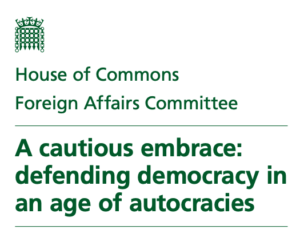Elsewhere on Unherd I’ve looked at the mixed outcomes of marketizing higher education, China flexing soft power via its commercial interests, and an excellent long read at Palladium examining the ‘campus wars’ as symptomatic of a crisis of confidence in the academy’s founding mission. This week’s long read recommendation brings these themes together in an immensely important report from the House of Commons Foreign Affairs Committee, that summarises evidence on (among other things) the influence of autocracies in UK academia.

While the report notes that the FCO is already defending the ‘rules-based international system’ in fields such as cybersecurity, disinformation and finance, the Foreign Affairs Committee here reports ‘mounting evidence’ of interference by autocracies in academia.
British universities have been encouraged to internationalise, but this has placed them in a bind: their mission obliges them to pursue academic freedom, but internationalisation encourages them to form partnerships with institutions in autocratic states where knowledge is in effect under state control. This can create conflicts of interest, to say the least: according to SOAS professor Steve Tsang:
Other examples include Uyghur Muslim students engaging in pro-Uyghur activism in the UK only to find her family experiencing harassment at home in China; pressure from university managers to cancel events relating to Tibet and Taiwan; and even a course funded by a Beijing venture capitalist withdrawn after concerns about academic freedom. Though the report indicates that ‘most of the evidence we received related to Chinese influence in UK universities’, other autocracies such as Kazakhstan and Russia were also active.
The Committee concludes with a strong (by the standards of such documents) recommendation that the FCO do more to address this issue explicitly, stating that it is ‘disappointed’ by the fact that ‘the FCO’s role in advising universities on the potential threats to academia from autocracies is non-existent.’ It recommends that the government gather more evidence of dictatorships meddling in British universities and – strikingly – ‘examine the extent to which market incentives may serve to undermine academic freedom in the UK’.
As the ‘rules-based international order’ continues to deliquesce, our academic sector continues to be pushed as a major export of UK PLC and autocracies such as China continue to flex their economic and political muscles, we can expect to see more such challenges to the norms of the Western intellectual tradition. Perhaps, as the report suggests, it is time for a discussion about the proper limits of market forces in areas as culturally and politically critical as academia.










Join the discussion
Join like minded readers that support our journalism by becoming a paid subscriber
To join the discussion in the comments, become a paid subscriber.
Join like minded readers that support our journalism, read unlimited articles and enjoy other subscriber-only benefits.
Subscribe